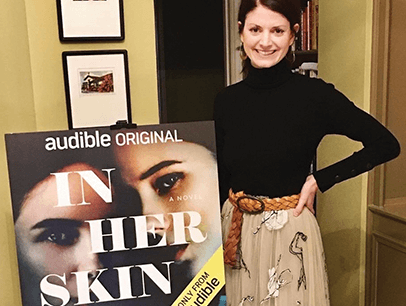 Co-authors Krista Wells (left) and Nicole Moleti
Co-authors Krista Wells (left) and Nicole MoletiWhen I co-authored my first fiction thriller with my friend Nicole Moleti, fellow authors told us, “Great, now you’ll need to pitch an agent.” My insides froze. Sure, I had the book’s pitch written on a piece of paper, but saying it out loud? That felt scary.
Yet I refused to let this fear engulf me and instead tapped into a similar feeling I’d worked through when attending my first Toastmasters meeting. If I could overcome the fear I felt that day, I could overcome the fear of making a live pitch to a literary agent.
In 2014, I was practically shaking when Jane Philion, DTM, welcomed me to West Hartford (Connecticut) Toastmasters Club. She said I could observe rather than speak and I was pleasantly surprised when later she asked only, “How did you enjoy the meeting?”
I breathed a sigh of relief and learned a great lesson. Just show up afraid; you’ll get through it.
I joined the club and after 10 speeches, my voice was less shaky, my posture more poised, and my “ahs” and “ums” were under control. I learned not to memorize and deliver a speech like a robot. I also learned that practice makes progress.
I let my membership lapse several years ago, but recently started attending the West Hartford club again as a guest, to prepare for that literary pitch at a writers’ conference in New York City. Then came the pandemic; I continued as a club guest through many Zoom meetings.
Finally, armed with new and refreshed presentation skills, Nicole and I began to perfect our book pitch. Our first run was so unnatural we ended up in tears of laughter, but it got a little easier each time.
We gave each other constructive feedback. We videotaped ourselves delivering the pitch and worked to keep it under the allotted time, as one would with a club speech.
On the train to New York City, we even tried our book pitch on a fellow passenger, a middle-aged man in a baseball cap, traveling with his son. He was intrigued, and a good sport. However, when we got to New York, I froze.
I learned a great lesson. Just show up afraid; you’ll get through it.
Mark Sullivan, a published author who had already been through this process, led us through a practice pitch session. That was fortunate, since I messed up my first line due to nerves.
However, his feedback reminded me of a seasoned Toastmaster delivering a top-notch speech evaluation. He had us rearrange the pitch structure, suggesting we lead with a quote about the 36 billion infertility industry, which is a big part of the book’s theme. He suggested a new, more compelling title. Our favorite tip was his advice to “relax and start over,” which left us both laughing in nervous relief. We were back on our feet and I was again reminded of the power of the Toastmasters’ process. Another author introduced us to the literary agent we’d be pitching before the actual presentation—it was just like experiencing a great speech introduction at a club meeting.
When the time came, I delivered the three-minute presentation almost perfectly. I tucked my nerves in my pocket, imagined myself in the front of my club on my best day, and articulated our book’s purpose, while keeping within the time limit and smiling. When the agent told us to send our manuscript, I felt grateful for all the Toastmasters skills I’d learned.
I decided right then to rejoin Toastmasters because if the agent signed us (he did, to a two-book deal), I’d need to continue tapping into effective public speaking skills to market the book in an authentic voice, without sounding too sales-y, robotic, or nervous.
I rejoined West Hartford in February 2021, and after the first meeting I knew I was back in the right place to master my next level of speaking skills and transfer those capabilities to my pursuits in the world of fiction authors.
Krista Wells, Ph.D. is a licensed professional counselor and life coach and podcaster with a passion for working with women. She is the author of two novels under the pen name Addison McKnight; An Imperfect Plan and The Vineyard Remains. Learn more at kristawells.com



 Previous
Previous
 Previous Article
Previous Article


